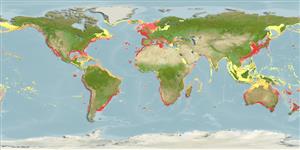| Native range | All suitable habitat | Point map | Year 2100 |

|
| This map was computer-generated and has not yet been reviewed. |
| Macroramphosus scolopax AquaMaps Data sources: GBIF OBIS |
Human uses
Fisheries: commercial; aquarium: public aquariums
Phylogenetic diversity index
(Ref. 82805)
PD50 = 0.7502 many relatives (e.g. carps) 0.5 - 2.0 few relatives (e.g. lungfishes)
Trophic Level
(Ref. 69278)
3.5 ±0.40 se; Based on food items.
Resilience
(Ref. 69278)
Medium, minimum population doubling time 1.4 - 4.4 years (K=0.36-0.46; tmax=6)